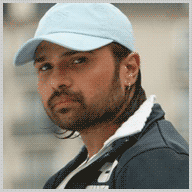
Selected Films
|
 Sneak peek into the life of Himesh Reshammiya Himesh started his career with a production house which aired quite a few TV soaps on Doordarshan Ahmedabad and Zee TV. Early in his career, he received critical acclaim for his musical scores, although the films associated with them were not popular at the box office. His first film as music director was Bandhan (1998), a collaboration with Anand Raj Anand. Although it was not the first film, he continues to credit it as the first. His work began to get noticed with the film Pyar Kiya To Darna Kya (1998). He became good friends with Salman Khan, and composed songs for many Salman starers. Reshammiya soon developed his own unique style of composition, based on pop music and catchy techno beats. He also places a particular emphasis on melodic hooks to his songs. His most popular albums to date are Tere Naam and Aashiq Banaya Aapne. With a series of popular film scores, he is considered one of the best upcoming music composers in Indian cinema today. His music is associated with the youthful culture that has recently been pervasive in India, but he has also shown versatility, focusing on a more classical style for films such as Banaras: A Mystic Love Story and semi-classical like Tere Naam. With almost 30-35 films in the working, Himesh has been advised to cut down on his work. In 2006, Himesh had well over 36 hit tracks in a single calendar year. Himesh was the first Indian to perform at the Webley Arena, London. Apart from the typical Bollywood style, he has composed music in classical, semi-classical, fusion and heavy metal styles too! He only prefers Sameer as his lyricist. Primarily a music director, Himesh later became popular for his vocals which have the distinctive high-pitched nasal twang. Reshammiya, like many of his contemporary music composers, sings several of the songs that he composes. However, he has had unprecedented success in this regard. He won a Filmfare Award in 2005 for Best Male Playback Singer (for the title song of Aashiq Banaya Aapne), becoming the first music composer to achieve this feat. |
|||